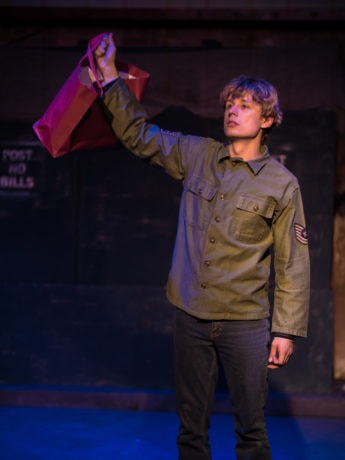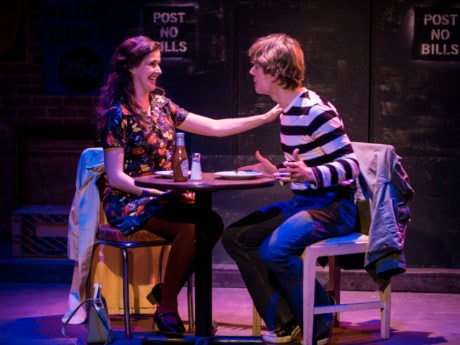One of the early, less-familiar works by Tony Award-winning playwright and librettist Terrence McNally (famed for his highly-acclaimed Love! Valour! Compassion!, Master Class, Kiss of the Spider Woman, and Ragtime), Where Has Tommy Flowers Gone?, presented by David Gow and Starting 5 Productions, has opened for a limited three-week run at The WorkShop Theater. With its themes of socio-political disenfranchisement and rebellion, the glorification of youth and celebrity in American pop culture, intense attitudes of entitlement and alienation, rampant off-the-cuff racial slurs and the sexual objectification of women, constant conflicts between the establishment and the counter-culture, and the belief in conspiracy theories and in radical acts to resolve challenging situations, the selection of McNally’s 1971 dramedy seems especially timely now, in our present climate of disunity and unrest.
Directed by Laura Braza with the requisite combination of outrageous humor, biting observation, and harrowing poignancy, the life of the eponymous 30-year-old anti-hero from the 1950s-70s, from his childhood in St. Petersburg, Florida, to his move to New York City, is portrayed through a series of vignettes, absurdist fantasies, and direct-address monologues that examine his psyche, formative moments, and the characters that most affected him. With an eye for young women, distaste for bourgeois life, a wild imagination fueled by pot, pipe dreams, and possible psychosis, a remorseless devotion to freeloading and shoplifting (“America’s a rich country. It can afford me”), and a knack for beating the system, the fictional Flowers charms and cons his way to an explosive ending with one final act of defiance, in, as the play is subtitled, The Glamorous, yet grueling, Life of a Rebel.

References to the era of the mid-20th-century abound, from the titular play on Pete Seeger’s plaintive folk song “Where Have All the Flowers Gone?” to the revolutionary advice of Abbie Hoffman’s Steal This Book and the cautionary ‘60s maxim “Don’t trust anyone over 30,” delivered by a mostly Millennial cast of emerging theater artists. Gow stars as the cute and cunning free-wheeling malcontent, bringing a mixture of youthful charisma, immature delinquency, and tragic doggedness to his role, first laughing at his escapades then lamenting at the realization of all that he’s lost. Despite his serious flaws and bad judgment, we can’t help but be amused by him (his over-the-top imaginings of himself as James Dean, a young handicapped girl confronting the First Lady, and Marilyn Monroe with a Spanish accent are hilarious), to care about him, and to hope he’ll begin to recognize the true value of the relationships he’s developed – with his new girlfriend Nedda Lemon, his fellow vagrant Ben Delight, and his lovable dog Arnold – before it’s too late.
A supporting ensemble of six assumes multiple roles as the roster of people we encounter in Flowers’ anecdotes. Daniel O’Shea is a standout as Ben, the homeless former actor befriended by the protagonist, who weaves tales of his time in the theater and the stars he knew with the commanding voice and dramatic elocution of a thespian. As Nedda, Emma Geer displays the development of her character from a pilfering aspiring violinist, attracted to Tommy’s alluring nonconformist ways, to a repentant petty thief who tires of their unconventional life style. Sam Garber makes for an adorable anthropomorphic Arnold, scratching himself, sniffing, and showing his devotion to those who treat him kindly, before being thoughtlessly left alone on the street by his owner and expressing his heartrending feelings of sadness and abandonment to the audience.

Rounding out the cast are Emily Kitchens, contributing her fine comedic skills as The Women (Flowers’ complaining mother, an ex-girlfriend stuck in a traditional marriage, and a Bloomingdale’s shopper who walks in on Tommy and Nedda in the lady’s room); Noelle Franco as The Girls (a sexually-liberated stewardess and shockingly conservative student from California bedded by him); and Al Fallick as The Men (including Tommy’s rebellious nephew, unhappy brother, and a loquacious cabbie who takes Tommy, Ben, and Arnold on a wild and bumpy ride, in one of the show’s most amusing scenes of physical comedy).
The actors are supported by an excellent design, with vintage-style character-defining costumes by Susanne Houstle, clear and immersive sound effects by Cody Hom, mood-appropriate lighting by Abby May, a set and props by Zach Serafin that efficiently transition from a derelict city street to a variety of other locales (with an old-fashioned marquee that identifies McNally’s titles for the different scenes), and climactic special effects by Geoff Vitiello.
Despite the show’s occasionally stilted delivery and slow pacing of certain segments (with a running time of over two-and-half hours it could use some streamlining), Starting 5’s production presents a welcome opportunity to see one of McNally’s seminal works. And although its story is set in the turbulent decades of the last century, the current team of Where Has Tommy Flowers Gone? recognizes its relevance for a new audience, addressing many of the important historic issues that have resurfaced in our own time.
Running Time: Approximately two hours and 35 minutes, including an intermission.

Where Has Tommy Flowers Gone? plays through Sunday, December 17, 2017, at The WorkShop Theater – 312 West 36th Street, 4th floor, NYC. For tickets, call (800) 838-3006, or purchase them online.




